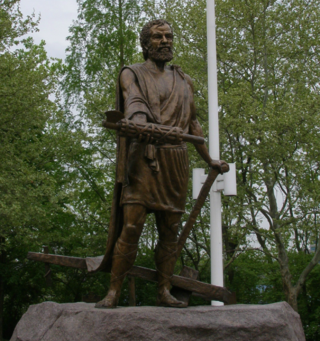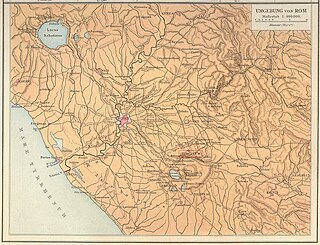
Lucius Minucius Esquilinus Augurinus was a Roman politician in the 5th century BC, consul in 458 BC, and decemvir in 450 BC.

Lucius Minucius Esquilinus Augurinus was a Roman politician in the 5th century BC, consul in 458 BC, and decemvir in 450 BC.
Brother of Quintus Minucius Esquilinus Augurinus, consul in 457 BC, he was a member of the Minucii Augurini branch of the gens Minucia . Lucius was the son of a Publius Minucius and grandson of a Marcus Minucius. His complete name is Lucius Minucius P.f. M.n. Esquilinus Augurinus. [2]
In 458 BC, he was consul with Gaius Nautius Rutilus. [3] Livy, Dionysius of Halicarnassus, and Diodorus Siculus called him consul ordinarius, but according to the Fasti Capitolini , he was the consul suffect, replacing a certain Carvetus who died at the beginning of his term. [3]
This year, Rome had faced an assault by the Aequi whose treaty had expired the year before and Roman territory was pillaged by the Sabines, reaching as far as the city walls. The consuls levied two armies, Augurinus alongside the dictator Lucius Quinctius Cincinnatus, named by consul Rutilus, [3] who relinquished command of the army once the mission was accomplished, and returned power to the Senate. [4] [3] Once back in Rome, Augurinus abdicated and command of his army was given to the praefectus Urbi, Quintus Fabius Vibulanus. [5] [6] [7]
In 450 BC, Lucius was elected as member of the Second Decemvirate against more qualified candidates thanks to the supportive actions of Appius Claudius Crassus, who had been decemvir the year before. This commission achieved the writing of the Law of the Twelve Tables, but under the influence of Crassus, they despotically maintained power after the end of their mission. [8] [9]
In 449 BC, the decemvirs, led by Crassus, illegally kept their power, against the will of the Senate and the people. [10] The invasion of the Sabines and the Aequi had consequently dispersed the decemvirs. Quintus Fabius Vibulanus, Manius Rabuleius, and Quintus Poetelius Libo met the Sabines in battle while Lucius Minucius accompanied Marcus Cornelius Maluginensis, Lucius Sergius Esquilinus, and Titus Antonius Merenda in their fight with the Aequi. [10] However, the army had revolted against the decemvirs, and the plebeians had left the city en masse for Aventine Hill. Lucius Minucius and his colleagues acquiesced and gave up their power - some left in exile. Their goods were confiscated. [11]
In 440 BC, a great famine had reached Rome. Given the urgency of the situation, the consuls had quickly elected a praefectus annonae ("Prefect of the Grain-market"), [12] some sort of manager of the Republic's grain supply, whose purpose it was to secure the grain supply. [13] It was probably this year that the aedile of the plebs, Manius Marcius, organized a distribution of grain for the plebs, where each individual was given one-third of a Roman bushel (modius). [14]
The example of Manius Marcius was soon followed by Spurius Maelius, a rich member of the Equestrian order, who had acquired great quantities of fresh wheat in Etruria, and then distributed it to the people for free. His popularity became such that the Patricians were convinced that he was only trying to gain support in order to become king. He had already taken measures for a coup. In the meantime, Lucius Minucius had informed Titus Quinctius Capitolinus Barbatus, and Agrippa Menenius Lanatus, who were elected consuls for the year 439 BC, and named Lucius Quinctius Cincinnatus dictator at the start of their term. Cincinnatus had Spurius Maelius assassinated by his magister equitum , Gaius Servilius Ahala. [15] According to ancient authors, Lucius Minucius was rewarded with the erection of a statue for having alerted the patricians to the danger that Spurius Maelius posed. [16] [17] [18]

Lucius Quinctius Cincinnatus was a Roman patrician, statesman, and military leader of the early Roman Republic who became a legendary figure of Roman virtue—particularly civic virtue—by the time of the late Republic.

The Battle of Mount Algidus was fought in 458 BC, between the Roman Republic and the Aequi, near Mount Algidus in Latium. The Roman dictator Lucius Quinctius Cincinnatus turned an expected Roman defeat into an important victory.
Appius Claudius Crassus InregillensisSabinus was a Roman senator during the early Republic, most notable as the leading member of the ten-man board which drew up the Twelve Tables of Roman law around 451 BC. He is also probably identical with the Appius Claudius who was consul in 471 BC.
The gens Verginia or Virginia was a prominent family at ancient Rome, which from an early period was divided into patrician and plebeian branches. The gens was of great antiquity. It frequently filled the highest honors of the state during the early years of the Republic. The first of the family who obtained the consulship was Opiter Verginius Tricostus in 502 BC, the seventh year of the Republic. The plebeian members of the family were also numbered amongst the early tribunes of the people.
Lucius Julius Iullus was a member of the ancient patrician gens Julia. He was one of the consular tribunes of 438 BC, magister equitum in 431, and consul in 430 BC.
Lucius Sergius Esquilinus was a Roman politician, and member of the Second Decemvirate in 450 and 449 BC.
Titus Genucius Augurinus was a Roman politician in the 5th century BC, consul and decemvir in 451 BC.
Servius Sulpicius Camerinus Cornutus was a Roman politician in the 5th century BC, consul in 461 BC and decemvir in 451 BC.
Titus Veturius Geminus Cicurinus was a Roman politician of the 5th century BC, consul in 462 BC and maybe decemvir in 451 BC.
Titus Antonius Merenda was a Roman politician, and decemvir from 450 to 449 BC.
Marcus Cornelius Maluginensis was a Roman politician and member of the Second Decemvirate in 450 and 449 BC.
Spurius Oppius Cornicen was a Roman politician and member of the Second Decemvirate in 450 and 449 BC.
Quintus Poetelius Libo Visolus was a Roman politician, and member of the Second Decemvirate in 450 and 449 BC.
Caeso Duillius was a Roman politician, and member of the Second Decemvirate in 450 and 449 BC.
Gaius Horatius Pulvillus was a Roman politician during the 5th century BC, and was consul in 477 and 457 BC.
Servius Cornelius Maluginensis was a Roman senator who was elected consul in 485 BC.
Lucius Lucretius Tricipitinus was a Roman senator in the fifth century BC, and was consul with Titus Veturius Geminus Cicurinus in 462 BC.
Lucius Papirius Crassus was a consul of the Roman republic in 436 BC and possibly a censor in 430 BC.
Aulus Sempronius Atratinus was a consular tribune of the Roman Republic in 425, 420, 416 BC and possibly consul in 428 BC.
Titus Quinctius Capitolinus Barbatus was a consul of the Roman Republic in 421 BC.